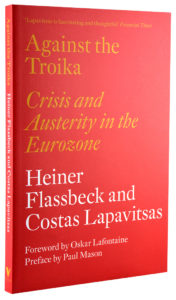

This is part of our round table on Against the Troika: Crisis and Austerity in the Eurozone.
What a difference a year makes. When Flassbeck and Lapavitsas’ Against the Troika was written, the extent and depth of the economic crisis in Greece made the rise to power of SYRIZA seem unavoidable. But SYRIZA’s intentions with regards to Greece’s position in the EU had always been equivocal since the party’s emergence as a major political force in 2012. Eventually SYRIZA’s position became a wish to end austerity and fundamentally renegotiate the parameters of economic policy in Greece, but that Greece should remain in the Eurozone.
This position was far from uncontroversial within SYRIZA. Perhaps as much as 40 percent of the party apparatus believed that any fundamental change of economic policy was incompatible with Eurozone membership. Costas Lapavitsas was one of them. As an economics professor at SOAS in London and then a member of SYRIZA, he propagated the view that only an exit from the Eurozone could free Greece from austerity. Unfortunately for him however, staying in the Eurozone was just as popular among the Greek public as ending austerity. SYRIZA won the January 2015 election based on the joint promise to end austerity and keep Greece in the common currency zone.
What ensued was a dramatic and slightly bizarre escalation of the Greece-Eurozone relationship. For six months, prime minister and SYRIZA leader Alexis Tsipras, under the spell of his finance minister Yanis Varoufakis, progressively moved towards a direct confrontation with Greece’s creditors. The dream of people like Lapavitsas seemed increasingly probable on the night of the dramatic referendum of July 5, 2015 when Greeks overwhelmingly voted against an austerity package it became almost a certainty.
The dream of people like Lapavitsas seemed increasingly probable on the night of the dramatic referendum of July 5, 2015 when Greeks overwhelmingly voted against an austerity package it became almost a certainty.
And then Tsipras sacked Varoufakis and signed a third bailout. SYRIZA’s anti-euro wing left the party and formed the Popular Unity—among them Lapavitsas. In the September snap election, Popular Unity, with Lapavitsas as a candidate (and a star in one of the party’s quirky TV campaign commercials), failed to enter parliament. Greece stayed in the euro—and continues to implement a painful Eurozone-inspired adjustment program.
Against the Troika, co-written by Lapavitsas and Heiner Flassbeck, a German economist with ties to Oscar Lafontaine, is essentially two books in one. The first half is a Keynesian analysis of the flaws of the Eurozone architecture; the second half is a condensed political program of how a country could negotiate and implement an exit from the euro. It is easy to assume which of the two co-authors wrote which part. The first half is an academic and policy analysis; the second half is a thinly veiled political pamphlet. Perhaps most interestingly, the first half is primarily about Germany and the second half is about Greece.
The argument of the first half of the book is that the Eurozone has failed to institute a real convergence of competitiveness between the members of the European currency union. In theory, the ECB pursues a specific inflation target across the whole of the Eurozone. The main indicator of economic competitiveness is the growth rate of unit labor costs. Germany followed a policy of wage restraint, which meant that the growth of its unit labor costs was much smaller than the Eurozone inflation target. Germany was the only country to pursue this policy, and this allowed it to increase its export market share in the European and the global economy, thus crowding out other European economies.
These imbalances made the Eurozone prey to the global financial tumult. But the main reason the crisis became so acute was the policy response of the Eurozone.
These imbalances made the Eurozone prey to the global financial tumult. But the main reason the crisis became so acute was the policy response of the Eurozone. The only way for the Eurozone to regain global competitiveness as a whole would be for a convergence of the growth rate of unit labor costs across the monetary union. Crucially, this means that Germany would have to allow a rise of its wage costs and consumption while deficit countries slowly adjust to a slower rate of growth or reduction of their unit labor costs.
And yet this has not happened. Instead of Germany reversing its strategy of lower-than-average inflation, wage restraint, and weak domestic demand as factors of international competitiveness, this strategy was projected by the Eurozone authorities and the Commission as the model to be replicated by all other Eurozone members at the same time—a fallacious hope to enhance the aggregate competitiveness of the Eurozone as a whole.
While one can mount many legitimate criticisms at the way politics and economy were run in deficit countries of the Eurozone (not the least Greece, an exemplary case of mismanagement), the first half of the book makes a very important point that adjustment across a monetary union cannot concern only some of its members and run only in certain directions and not others. The adjustment of Germany in an inflationary direction is the only way for the adjustment of everybody else in an opposite direction to have any chance of succeeding.
The analysis in chapter five is particularly interesting in showing how the EU and the Commission’s understanding of “structural imbalances” remains wedded to the view of excessive deficits as something wrong, while leaving excessive surpluses off the hook (despite a formal agreement that surpluses would also be subject to review and recommendations for adjustment in the EU). Ultimately, the ideological appeal of low wage competitiveness and German clout combine to keep European authorities from enforcing a fair bargain for adjustment across the Eurozone.
Unfortunately, in the second half of the book, the analysis does not follow the same standards of policy-relevant clarity. The two parts are bridged by the assumption that Germany would “never” accept an increase of its inflation and demand while others adjust. Instead, the book puts forth the notion that the Eurozone is hopeless for deficit countries (and particularly Greece) and that only exiting from the euro can save them from a prolonged period of economic and social stagnation. As the authors put it, there is an impossible triad of preferences for deficit countries: They cannot have all three of an end to austerity, debt reduction, and membership of the Eurozone. Given this, deficit countries—and particularly a “government of the Left”—should institute an exit from the euro.
The book then tries to outline in a few dozen pages how a country could negotiate something as immense as an exit from the euro and the disruptions this would produce. Inevitably, the analysis is full of speculation and unfounded assumptions, such as when calling on a future government of the Left to “mobilize domestic and international support” to help a country when exiting the euro.
The problem with this argument is that the scenario laid down in the second half of the book came tantalizingly close to its realization in Greece in the summer of 2015, and the results were not pretty. The prospect of exit from the euro led to the effective collapse of the banking system. A de facto closing off of Greek businesses and consumers from the outside world ensued. The practicalities of an exit from the euro would be so complex that they could never be dealt with in the short period of time required before the erosion of trust led to the erosion of the economy as well. “Mobilizing international support” never was more than the verbal support of SYRIZA’s ideological allies—peripheral forces in most European countries.
It is very rare (and therefore fascinating) that the policy implications of a book are put to the test precisely at the time of its publication. Unfortunately, the eventual course of action in Greece (i.e. coming very close to realizing the suggestions of the second half of Against the Troika) did a lot to neutralize the effect of a very important debate that should take place in Europe around the critique developed in the first half of the book. In this, the book betrays Lapavitsas’s (and many others’) severe misunderstanding of how a complex policy system like the EU works.
The main problem is that rupture and confrontation are cognitively alien concepts in a system like the EU, built around delicate balances and the search for consensus. The first six months of SYRIZA’s reign did a lot to delegitimize many very legitimate arguments about the ills of Eurozone governance, precisely because they were carried over by politicians with little capacity to translate them into more broadly relevant points for the whole of Europe.
In some ways, SYRIZA’s first, tumultuous, term in office reflected the structure of Against the Troika: embarking from a broad reading and many accurate insights about the flaws of the Eurozone and global capitalism, the “first government of the Left” degenerated to an idiosyncratic confrontation strategy that did little more than reinforce the view that Greece is an exceptional case in Europe. Lapavitsas’s policy suggestion almost became a self-fulfilling prophecy, and the baby of the necessary reform of the Eurozone was almost thrown out with the bathwater of Varoufakis’ game theory delusions and Greece’s image as an unruly, quasi-failed state.
Given the absolute disaster that the Greek experience of last summer was (SYRIZA’s re-election in September notwithstanding), what one now expects from the Left is a credible strategy to infuse the insights about imbalances in the Eurozone to the epicentre of relevant Europe-wide policy debates. The cause to reform the Eurozone remains topical, and the questions the first part of this book raises will surely resurface again. It is only hoped that the real-life experiences with some of the proposals suggested in the second half of this book have not killed off the prospect of change in Eurozone permanently.
Angelos-Stylianos Chryssogelos teaches European politics at King’s College London. He has been a postdoctoral fellow at the Hellenic Observatory of the London School of Economics.
Against the Troika: Crisis and Austerity in the Eurozone
by Heiner Flassbeck and Costas Lapavitsas
Verso Books
Paperback / 144 pages / 2015
ISBN: 9781784783136
Published on January 5, 2017.




